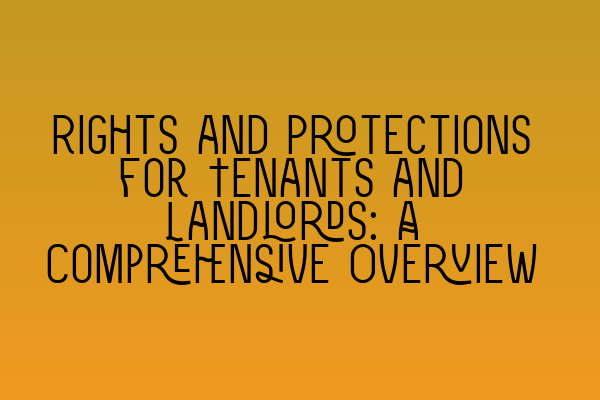Rights and Protections for Tenants and Landlords: A Comprehensive Overview
As a tenant or a landlord, it is crucial to understand your rights and the protections available to you under UK property laws. This comprehensive guide will provide you with an overview of the key rights and protections that tenants and landlords should be aware of. Whether you are a first-time renter or a seasoned property owner, it is important to stay informed and up-to-date on these matters.
Before we delve into the specifics, it is worth mentioning that property laws in the UK are constantly evolving. To stay updated on the latest changes and implications, make sure to check out our related article on “Updates in UK Property Laws: Key Changes and Implications”.
Let’s start by highlighting some essential rights and protections for tenants:
1. Right to a Safe and Habitable Property: As a tenant, you have the right to live in a property that meets certain health and safety standards. The property should be free from hazards and in good repair. Landlords are responsible for ensuring that the property is safe and habitable.
2. Protection against Unfair Eviction: Tenants have the right to be protected against unfair eviction. Landlords cannot evict tenants without a valid reason and must follow the proper legal process, which includes providing notice and obtaining a court order if necessary.
3. Deposit Protection: When you pay a deposit to your landlord, it must be protected in a government-approved tenancy deposit protection scheme. This ensures that your deposit is safely held and can be returned to you at the end of the tenancy, minus any deductions for damage or unpaid rent.
4. Privacy and Freedom from Harassment: Tenants have the right to privacy and should not be subjected to harassment or intrusion from their landlord. Landlords must respect your right to peaceful enjoyment of the property.
5. Rent Increases: While landlords have the right to increase the rent, there are certain rules and limitations in place to protect tenants. Any rent increase must be fair and reasonable, and tenants should be given proper notice before the increase takes effect.
On the other hand, landlords also have important rights and protections:
1. Right to Receive Rent: Landlords have the right to receive rent from their tenants in a timely manner. If a tenant fails to pay rent, landlords can take legal action to recover the unpaid rent or seek eviction.
2. Right to Entry: Landlords have the right to enter the property for certain purposes, such as conducting repairs or inspections. However, they must provide proper notice to the tenant and ensure that any entry respects the tenant’s privacy.
3. Property Damage: Landlords have the right to seek compensation for any damage caused to their property by the tenant, beyond reasonable wear and tear. It is important for landlords to document the property’s condition before and after a tenancy to assess any damages accurately.
To navigate these rights and protections effectively, it is crucial to be aware of potential legal challenges that may arise in property transactions. To gain a comprehensive understanding of these challenges, read our related article on “Legal challenges in property transactions: A comprehensive guide”.
Lease laws also play a significant role in the tenant-landlord relationship. Both parties need to understand their obligations and rights under a lease agreement. To learn more about navigating lease laws in the UK, refer to our related article on “Navigating Lease Laws in the UK: Essential Guidelines for Tenants and Landlords”.
It is worth mentioning that property law can be complex, and it is crucial to approach it with the right knowledge and preparation. To avoid common pitfalls and confidently answer property law questions, read our related article on “Dominate Property Law Questions: Avoiding Common Pitfalls”.
Finally, if you are a student preparing for your property law exam, our related article on “Land Law Revision Tips: Ace Your Exam Preparation” will provide you with valuable tips and strategies to excel in your studies.
In conclusion, understanding your rights and protections as a tenant or landlord is essential for a smooth and fair property rental experience. By staying up-to-date on the latest changes in property laws, being aware of legal challenges, and navigating lease agreements effectively, you can protect your interests and ensure a positive landlord-tenant relationship.
